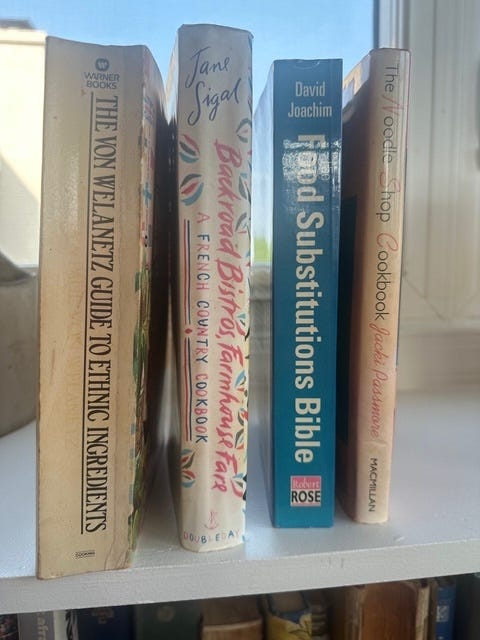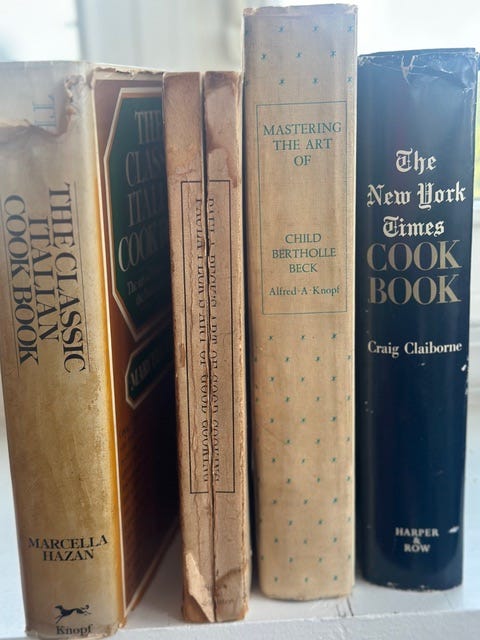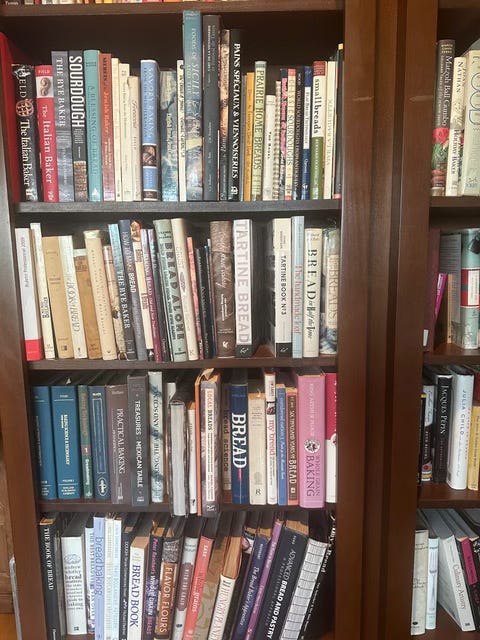A year or so ago, I let go of some of my cookbooks. I took them to the bakery, and our manager and partner, Scott Auslander (always the entrepreneur), offered them to our customers for a dollar each. I had brought in perhaps 50 books, and they went very fast.
I first bought a cookbook when I was still in college. That early in life, I was already interested in food and in cooking. I was then cooking for a Vermont boys’ camp and needed some instruction. That summer, at 19 years old, I hitchhiked into Rutland, Vermont, and bought The Better Homes and Gardens Cookbook in the only bookstore there. I did not know nearly enough about cooking to get through the season without help, so that book was my lifeline. I still have it today — it’s sentimental.
I have never been a book collector, and I never haunted places like The Strand or other used bookstores. But over the years, I occasionally bought cookbooks. I read about them in the New York Times seasonal roundups — the cookbook section generally written by my friend, Corby Kummer. I trust Corby, so if he was effusive about a book, I’d go to Politics and Prose, look at it, and sometimes buy it.
For most of my life, cookbooks were how we learned to cook dishes we hadn’t cooked before. We didn’t have the Internet until recently — we couldn’t just search online for a new tomato recipe or a different way to cook chicken when we got tired of the recipes we knew. My sister Carla got so bored with her recipes that she wrote and privately published her own cookbooks.
In spite of myself, over the last 70 years I’ve bought and accumulated perhaps 300 cookbooks. They now crowd the bookshelves in the back of my home.
These days, it’s far easier to find recipes on the Internet than to search for them in cookbooks, so I don’t rely on them the way I used to. Still, I buy the occasional book — often to understand a cuisine I’m not familiar with. A book on Cambodian food, for example, gives me the elements of that cuisine and suggests ingredients I wouldn’t have at home. I don’t follow recipes exactly; I treat them more as inspiration than instruction sheets.
I never bought cookbooks for display — I didn’t have a coffee table. I do now (sort of), and occasionally I receive a big book from Thomas Keller or from Nathan Myhrvold, the former Microsoft officer who created Modernist Cuisine. His books, a mix of food and photography, have taught me a lot about how bread works.
For a few years, our bakery had a small library tucked away in the back of the parking lot. It wasn’t very visible, so we relocated it. Now, a brand-new Little Library sits near the bakery’s back door, and we can’t keep it stocked. That’s one reason I’m preparing to dig into my home library and bring in books I no longer need.
But that’s easier said than done. There are certain cookbooks I simply can’t part with:
The Settlement Cookbook, tattered and coverless, which my mother used during the War.
James Beard American Cookery, given to me by my beloved aunt in 1961 as a welcome-to-Washington gift.
The Better Homes and Gardens Cookbook I bought at 19 for my first cooking job.
Classics like Joyce Goldstein’s Back to Square One.


The Settlement Cookbook & Back to Square One
Then there are the baking books. I could try to pass them on to Ben Arnold, our production director, but I doubt he’ll want them. Selling them to a used bookstore sounds like too much trouble — and really, how many people want professional bread books? Many of these came from my years running The BreadLine, my luncheon bakery that made bread-based portable foods inspired by cultures around the world. I loved that work, but I’m not going to do it again.
So, I’ve decided: I’ll keep the personally valuable books, the ones I might conceivably use, and the great classics. The rest will go — likely to the bakery’s Little Library, where Scott may or may not let them go for free.


That’s the plan, anyway. Now I just have to decide which ones I can truly let go.



Please keep us posted on how your plans go.... I have too many cookbooks (and too many books in a sort of "food book" genre). Sooner or later, I'll need to make my own plans — so always interested in how others' deaccessioning goes. p.s. It's always such a great pleasure to visit Bread Furst when I'm in D.C. (introduced to me by our mutual friend, Shelley F.).
Hi, Mark:
My Mom was not a cookbook collector but she had the Settlement Cookbook. When I was a teenager she allowed me to experiment with cooking as long as l cleaned the kitchen afterwards. I baked a lot of cakes that turned out pretty good. But when I attempted to bake a pumpernickel bread I left out the yeast. I didn't know what yeast was (and it seemed such a small amount) that I decided to leave it out. The result was a pumpernickel doorstop! I eventually got over that failure and learned to bake bread. I still bake bread every week , since we don't live near your store.